London, Aug 9 : London's population has been rising steadily since the mid-1980s but evidence has emerged that Brexit and the high cost of buying and renting homes is deterring new people from coming to live in the city.
The London Intelligence Report published on Wednesday by the think-tank the Centre for London showed that in the year to mid-2017 London's population experienced the slowest rate of growth in over a decade, Xinhua news agency reported.
The growth rate in the city's population, which stands at 8.1 million people, nearly halved in the first full year since the Brexit referendum in June 2016 to 0.6 per cent per year, down from the 2015-16 figure of 1.1 per cent.
This is the slowest rate of growth in over a decade, and means the 2017 population was 79,000 (0.9 per cent) lower than expected within 2016-based projections.
Tom Colthorpe, researcher on the report told Xinhua: "There are many fewer people coming to London from other countries."
"There is a bit of a nosedive. There is a pretty significant drop in international immigration which some might point to Brexit." The contribution of net international migration has declined considerably year-on-year to a net gain of just under 83,000 individuals.
Though international migration remains the largest contributor to population growth, it now only contributes 5,000 more individuals than those added through natural change (births and deaths).
Registrations for national insurance numbers (known as NI, a form of health tax necessary for most types of work) continued to fall, a trend seen since the Brexit vote.
The number of EU nationals registering for NI fell by a quarter over the year, and the most recent quarter available (Q1 this year) saw the total 16 percent smaller compared to a year previously, and only just over half the Q3 2014 peak level.
At the same time, non-EU registrations grew by 9 per cent, reversing the trend seen in the previous four consecutive quarters of falls.
"It is obvious with EU citizens, that some of that (decline) is down to Brexit and that is down to the uncertain status of EU nationals in the UK," Colthorpe said.
Figures in 2014 for EU nationals getting NI numbers spiked, when Romanian and Bulgarian nationals were allowed to apply for the first time, as part of the EU accession agreement for those countries in 2007.
Colthorpe said: "When you see that in 2014 after the accession of Romania, Bulgaria, a lot of that causes a big spike of 80,000 in a quarter. Some of the decline has been because that pent-up demand has tailed off, but the fall has been accelerated by the Brexit factor."
British nationals were also leaving the city, in higher numbers than previously. "Looking over a longer period, after the financial crisis people flocked to London, but now that trend is reversing,"he said.
Let the Truth be known. If you read VB and like VB, please be a VB Supporter and Help us deliver the Truth to one and all.
Dubai: Smoke was seen rising from an area near the United States Consulate in Dubai, according to witness accounts cited by Reuters.
There was no immediate official confirmation on the extent of damage or whether there were any casualties in the incident.
Earlier, the US embassy in Riyadh, Saudi Arabia’s capital, was also attacked. Authorities reported damage to the premises, but no casualties were recorded.
The developments come amid heightened tensions in the region, with Iran continuing to target US interests in the Middle East following deadly attacks launched on Saturday by Israel and the United States.
Near US embassy in Dubai pic.twitter.com/z5VTZNVxNO
— Sahil Shah (@thesahilsshah) March 3, 2026





